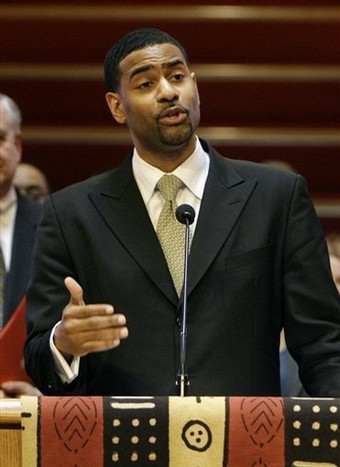A few of my classmates gathered for supper in the hotel bar and decompressed on our day. We talked about our excitements from this week--the things we are hearing that make us feel hopeful, that are shaping our understanding of the preaching task, that open us up to new ways of engaging Scripture, and of approaching the sermon. And we also discussed the things that have been difficult, that we're wrestling with, and with the things that we aren't quite sure what to do with yet. And I'm noticing our conversations are affecting the conversations of others--with Eden alums who gather with us during breaks, with clergy we share meals with, with people who overhear. We are critically engaging the experience in a way that I think a lot of people here are longing to do, but either don't have the community or tools to do. Anyway...that was my Go Eden! moment of the post.
I want to give myself a bit of space to talk here about racial diversity at the Festival. As one of my classmates put it, "There is an awful lot of salt, and not much pepper." Actually, we observed that our class alone contributes to at least a 100% increase in the number of people of color in attendance. Beyond that, a significant portion of the time spent worshiping and hearing preachers is couched in a liturgical setting that is largely WASP-y. It's interesting to see how aware of this we are because of our experiences of other traditions and practices as we engage in our studies at Eden. We are noticing the null curricula because it's not a null curricula where we study. There are a couple of things I want to use this space to begin to consider:
- While most of the preachers are acknowledging issues of racism and systematic oppression, I find it interesting that much of this engagement isn't more than a tip of the cap to it. There are some amazing people of color who are preaching and lecturing, and so part of me wonders if the unspoken assumption is that the preachers who are people of color will "deal with" that in their time or if it's a discomfort with offering a perspective when it is not one's own culture. Can a white, female preacher preach about race issues? Should she? (I think the answer is yes, with great humility and care.) And actually, I'm beginning to feel like the tip of the cap is actually a way to acknowledge without really acknowledging: "I know this is a problem, but I don't know what to say about it." Actually, there are a number of issues we've been dancing around in this same way: homosexuality, gender identification, young people in the church, the reality of pluralism. Now, I know that this isn't a Festival on Social Justice, so not every message is going to deal expertly with these things. But not dealing with them at all doesn't work either.
- I'm also noticing an approach to preaching that really gives a lot of power to the congregation--that seems to be molded around an assumption of middle-class white privilege. And looking out at the congregation, I can understand that. You are preaching to a particular people. I think it was in observing Otis Moss III's lecture that I most acutely saw this--parts of his lecture were from texts or sermons of his I had encountered before. But what was interesting is that so much of the delivery was altered, packaged in a way that seemed more palatable for those gathered. This isn't a critique of Moss, but is an issue I'm having with the conference in general. So much of the messages we are hearing are calling us to prophetic preaching in one way or another, preaching that isn't saccharine-sweet, but that sticks its hands right into the rawness of the biblical text and our lives.
- So, then...shouldn't our form follow our content? Shouldn't our delivery be raw and authentic in a way that allows for the fullness of the preacher and the preacher's message to be preached? Or should we deliver things in a package that's easily recognizable. The answer is probably both. But the two preachers who I felt simply preached the message that God had laid on their hearts exactly as they would preach it to anyone were Yvette Flunder and Peter Rollins. Both definitely have a subversive edge, but even in their fullness of their subversive messages, they were accessible because they were speaking the truth. I think that truth transcends. I think that truth is what Yvette called speaking in tongues. I think that truth is what all of us want to do and are very afraid to. Because it requires a lot of work and a lot of honest with ourselves. But I, for one, want to do that work.
